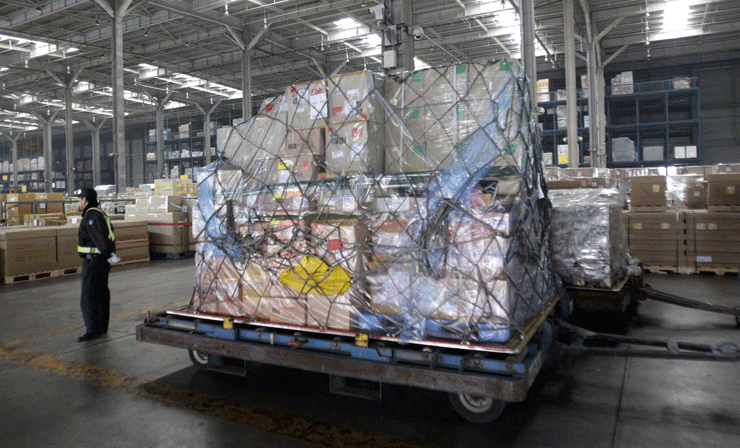European Politicians Face
Cloud Of Criticism


World air cargo backs up as Europe airports remains mostly
closed on Monday. Here Incheon cargo awaits Korean Air clearance
for flight to Frankfurt.
|
 Although German airspace is officially still closed, Lufthansa has exclusively
told Air Cargo News FlyingTypers that the airline managed to
obtain 50 special permissions from the German aviation authorities to
conduct immediate long-haul flights from Asia, the Americas and Africa
to Frankfurt, Munich and Dusseldorf.
Although German airspace is officially still closed, Lufthansa has exclusively
told Air Cargo News FlyingTypers that the airline managed to
obtain 50 special permissions from the German aviation authorities to
conduct immediate long-haul flights from Asia, the Americas and Africa
to Frankfurt, Munich and Dusseldorf.
“This means our stations can commence
checking in up to 15,000 passengers who are eagerly waiting to get a
flight to Germany, and handling agents can load some air freight tonnage
in the belly-hold compartments of our Boeing and Airbus fleet for transport
today,” said Peter Schneckenleitner, Lufthansa’s Manager
Corporate, Finance and Sustainability. The aircraft are scheduled for
landing tomorrow morning at the aforementioned airports.
These airports, along with the rest of
the German civil airports, remain officially closed for air traffic
until tomorrow morning 2:00 a.m. In addition, LH Cargo will conduct
six MD-11 freighter flights on special permission today; three outbound
to Shanghai, Hong Kong and Viracopos near Sao Paulo, and three inbound
from Almaty to Frankfurt.
Today Austria and the Czech Republic
reported the re-opening of their airports, including Vienna and Prague.
Commented Lufthansa’s Schneckenleitner, with irony in his voice:
“It’s very curious that the
ash cloud seems to stand still above German territory with neighboring
regions reporting clear air.”

  We
are pleased to announce that DB Schenker has sourced additional
warehouse space worldwide to accommodate as We
are pleased to announce that DB Schenker has sourced additional
warehouse space worldwide to accommodate as  much
client volume as possible. much
client volume as possible.
|
Peter Sauer spokesman for German logistics
giant DB Schenker told ACNFT:
“DB Schenker is trying to cope
with the situation as well as possible.
“The volcano has cut supply chains
globally and there is a global congestion often of thousands of tons.
“DB Schenker is still accepting
shipments.
“We are pleased to announce that
DB Schenker has sourced additional warehouse space worldwide to accommodate
as much client volume as possible.
"Furthermore we wish to advise that
DB Schenker is in the process of developing solutions to this congestion
to move freight via alternate transit points.
“Indeed, our experts have arranged
several flights already from Asia to southern Europe with onforwarding
to final destinations throughout Europe via Schenkers European Land
Transportation Network.”
Meanwhile, European airlines and international
aviation organizations have harshly criticized the complete absence
of effective crisis management by the EU and their transport ministers.
“It’s scandalous that the
decision to shut down wide parts of the airspace is based only upon
one source: a computer simulation provided by the British Volcanic Ash
Advisory Center,” offered German flag carrier, Lufthansa.
“No doubt, safety comes first.
“That is why we supported the immediate
closure of airports after the volcano erupted.
“What we criticize, however, is
the failure of the EU member states to start an immediate series of
scientific tests to evaluate the contents of the ash cloud in order
to get hard facts for further decisions.
 “Unfortunately, this was severely neglected by politicians and
national authorities alike,” Herr Schneckenleitner told ACNFT.
“Unfortunately, this was severely neglected by politicians and
national authorities alike,” Herr Schneckenleitner told ACNFT.
According to sources, so far Lufthansa
has lost 25 million Euros per day at a minimum, a figure that is based
on the costs incurred during one day of the recent pilot strike.
The airline did not rule out filing a
claim of recourse should tests prove that the closure of airspace was
based on faulty information.
Emirates confirmed in a recent statement
that the volcanic ash disruptions have caused losses upwards of 50 million
US dollars, and that is mounting.
So far, 80,000 passengers of the Dubai-based airline have been impacted
with 30 aircraft grounded.
Tim Clark, (right) President of Emirates,
commented: “The scale of this crisis is unlike anything I have
experienced in my career.
“The longer it continues, the more
complex the recovery process becomes. Like every carrier operating to
Europe, Emirates is facing huge losses – USD$10 million a day,
in our case.”
The sharp criticism issued by carriers
goes in line with comments by the Association of European Airlines (AEA)
and ACI Europe, the regional European branch of the Airports Council
International (ACI).
In a joint statement issued Sunday, the
organizations spoke of the cancellation of 63,000 flights with devastating
impact for the aviation industry.
 While Europe’s airlines and airports
consider safety to be an absolute priority, they are questioning the
proportionality of the flight restrictions currently imposed.
While Europe’s airlines and airports
consider safety to be an absolute priority, they are questioning the
proportionality of the flight restrictions currently imposed.
The eruption of the Icelandic volcano
is not an unprecedented event and the procedures applied in other parts
of the world for volcanic eruptions do not appear to require the kind
of restrictions that are presently being imposed in Europe.
Said Ulrich Schulte-Strathaus, (left)
Secretary General AEA:
“Verification flights undertaken
by several of our airlines have revealed no irregularities at all, which
confirms our requirement that other options should be deployed to determine
genuine risk.”
This has been confirmed by a number of
carriers, among them Dutch KLM and German Lufthansa.
 According to KLM, two commercial flights to the Far East were operated
on Sunday evening on special permission by the Dutch authorities.
According to KLM, two commercial flights to the Far East were operated
on Sunday evening on special permission by the Dutch authorities.
A Boeing 747 full freighter and a Boeing
747 combi aircraft operated the flights bound for Sharjah and Bangkok/Taipei
respectively.
Earlier on Sunday, KLM successfully operated
nine test flights.
None of these flights encountered any
problems. According to KLM President & CEO Peter Hartman, (right)
it is completely safe to operate flights during hours of daylight.
Lufthansa had similar experiences with
a series of test flights last weekend, including some missions with
MD-11 freighters.
“Our technicians didn’t detect
any ashes or other particles in the turbines after return of the aircraft,”
said Klaus Walther, Lufthansa’s Head of Corporate Communication.
Down on the ground we reached out to
Jo Frigger, CEO of EMO Trans, who noted that “European governments
were slow to pick up on the impact of shutting (airports) down”
as clouds from Iceland caused the aviation business across the continent
to go “ashes to ashes.”
 “As much as the volcano event was reported, it was still a beautiful
European weekend, which may account for the initial laissez-faire attitude.
“As much as the volcano event was reported, it was still a beautiful
European weekend, which may account for the initial laissez-faire attitude.
“But today (Monday) with necessary
air freight goods dwindling and test flights occurring at various gateways,
if results are good, things should get going again.
“The impact is much wider than
just flowers and vegetables.
“Now we must also account for large
portions of the manufacturing community that have or will run out of
important parts.”
“Monday is a slow day for shipment
action as most companies move their cargo at the end of the week/weekend.
“If this goes on much longer the
story will be quite different.
“As for EMO our goods are at the
airport awaiting clearance for takeoff,” Herr Frigger said.
In the meantime, the late-out-of-the-gate
International Air Transport Association (IATA), which has remained mostly
numb and silent since all of this began, is now adding its voice in
criticizing European governments “lack of leadership in handling
airspace restrictions.”
“We are far enough into this crisis
to express our dissatisfaction with how governments have managed it
– with no risk assessment, no consultation, no coordination and
no leadership,” said IATA DG Giovanni Bisignani.
As you read this, flights are operating
into Portugal, Spain, Greece, Russia and Turkey.
Partial closures are in effect for France
(northern airspace, including Paris, closed until today), Italy (northern
airspace closed until today), and Norway (limited flights in the north).
Still closed are Belgium, Bulgaria, Denmark,
Finland, Germany, Ireland, Latvia, Luxembourg, Netherlands, Poland,
Slovakia, Sweden, Switzerland, & UK.
What may be the strangest or most telling
bit of “other news” in air cargo to come out of this latest
crisis is the almost total lack of information on any air cargo website
informing customers or the curious about what to expect.
The thing that makes this almost total
lack of information so strange is that companies like FedEx, UPS, DHL
(DHL does note “service interruptions in Germany” but offers
no alternatives) and others, including IATA Cargo, all regularly spend
vast sums selling their product with guarantees of transparency and
total customer information.
If the future is indeed paperless and
the virtual communications model is “at the doorstep” of
air cargo, then what better time than now, in a crisis that has shut
down the industry’s European operations, to utilize the internet
as a quick and accessible avenue of communication? At a moment when
most are rushing to their computers to garner any information as to
what to expect, how can all these companies afford their silence?
As of Monday in New York City at 1200
hrs, the aforementioned companies, along with the vast majority of air
cargo companies, have not thought to include the slightest tidbit on
their web sites that would update the consumer on what they are doing
to cope with a crisis that is now described as having a worse financial
impact on the air cargo industry than the 9/11 tragedy.
Kudos must therefore go out to Lufthansa
Cargo, Panalpina and the few others who have updated all weekend long
and continue to do so.
Heiner/Geoffrey/Flossie |


 “Unfortunately, this was severely neglected by politicians and
national authorities alike,” Herr Schneckenleitner told ACNFT.
“Unfortunately, this was severely neglected by politicians and
national authorities alike,” Herr Schneckenleitner told ACNFT. While Europe’s airlines and airports
consider safety to be an absolute priority, they are questioning the
proportionality of the flight restrictions currently imposed.
While Europe’s airlines and airports
consider safety to be an absolute priority, they are questioning the
proportionality of the flight restrictions currently imposed. According to KLM, two commercial flights to the Far East were operated
on Sunday evening on special permission by the Dutch authorities.
According to KLM, two commercial flights to the Far East were operated
on Sunday evening on special permission by the Dutch authorities. “As much as the volcano event was reported, it was still a beautiful
European weekend, which may account for the initial laissez-faire attitude.
“As much as the volcano event was reported, it was still a beautiful
European weekend, which may account for the initial laissez-faire attitude.